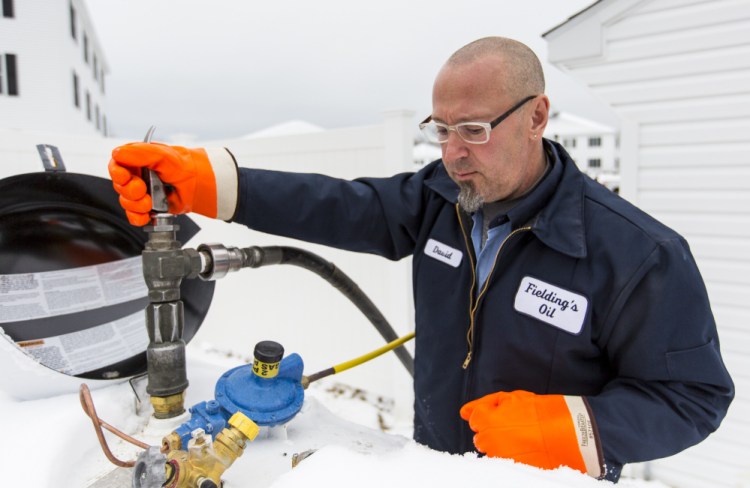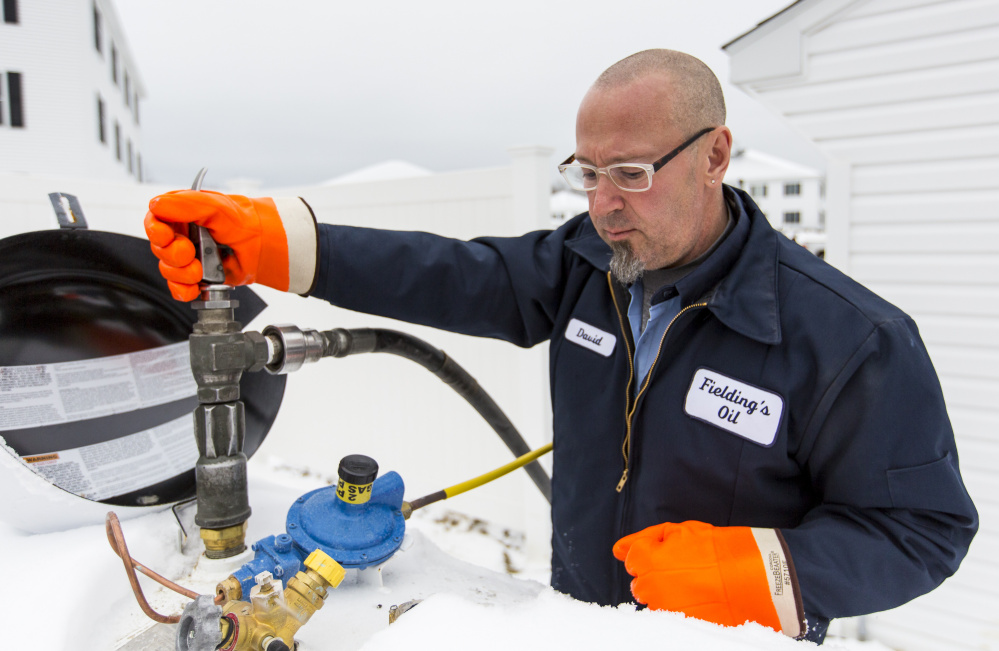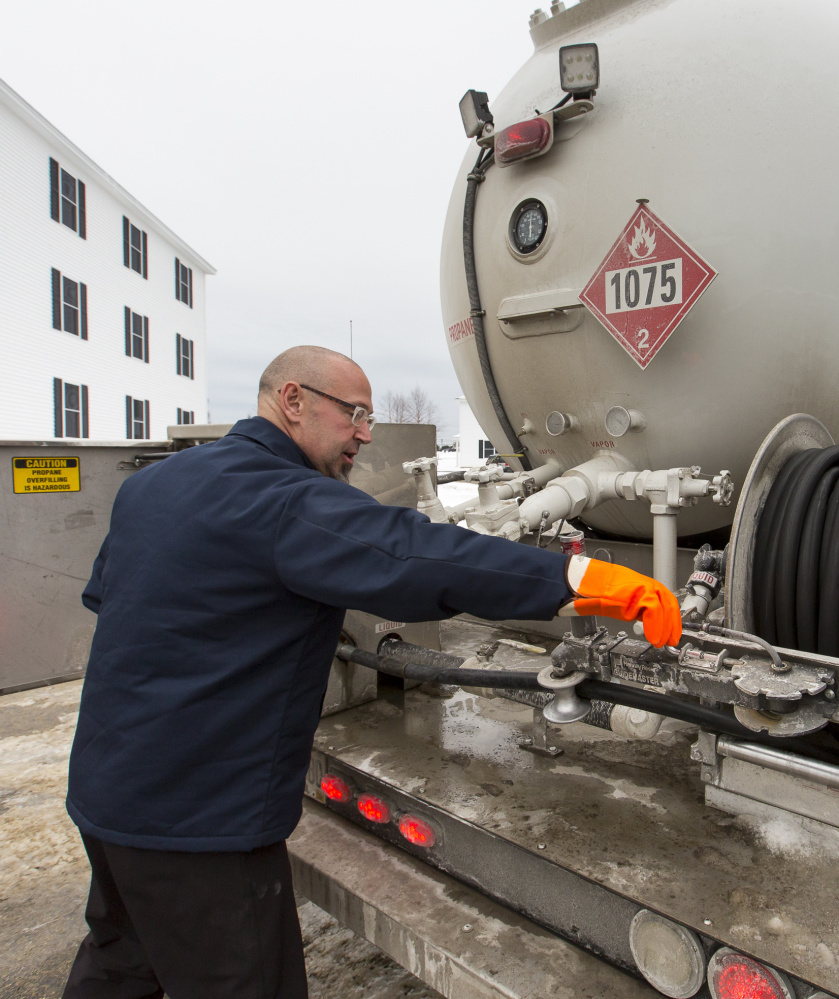The dispute in South Portland over a proposed propane terminal comes at a time when propane use is increasing in Maine and changes in the market have made the supply chain more vulnerable during severe winter weather.
Unless more storage capacity is created, consumers could pay more for propane and face greater risks of shortages, say industry leaders and state officials. Such an event occurred two winters ago, prompting Gov. Paul LePage to issue an emergency proclamation allowing heating fuel delivery trucks to work extra hours to distribute limited supplies so customers would not freeze.
“We are a couple of big snowstorms away from being in trouble,” said Lisa Smith, a senior planner with the Governor’s Energy Office.
Since 2010, the number of Maine homes using propane heat has increase from 6.5 percent to 9 percent, said Patrick Woodcock, the office’s director. At the same time, the source of that propane and the means of shipping it have changed.
The issue is coming to the fore because a proposal to locate a new propane terminal in Rigby Yard in South Portland is meeting local resistance. The rail yard is the new home preferred by NGL Supply Terminal Co., which must leave its current location near Portland’s International Marine Terminal to allow for an expansion of that facility. Residents of South Portland have challenged NGL’s move, raising safety and zoning concerns.
But industry observers worry that a rejection of the project would shrink the state’s propane storage capacity at a time when there’s already a shortage. The industry in recent years has been working to expand its storage capacity adjacent to rail lines throughout New England to catch up to changes in the propane market.
Before 2010, 60 percent of Maine’s propane was imported into New England via ship, primarily from Algeria. More than half of southern Maine’s propane came by ship to Newington, New Hampshire, which has a 23 million-gallon tank farm.
Those imports have largely stopped because domestic propane is cheaper, Woodcock said. Propane is a byproduct of natural gas processing, which has seen a huge increase because of the U.S. shale boom.
Today, 80 percent to 90 percent of the propane supply comes from domestic sources. The propane comes to Maine by rail because the nearest pipeline is in Albany, New York – too far away to make trucking the fuel economically viable, said Joe Rose, president of the Propane Gas Association of New England.
Although moving propane by rail is cheaper than by truck, rail is more vulnerable to delays during bad winter weather. Rose said the industry needs as much storage as possible, and it makes economic sense that a depot be located in Maine’s largest rail yard so trains can load the propane directly into tanks. He said the propane brought by rail into Maine – destined for as far north as southern Aroostook County and as far south as coastal New Hampshire – goes through Rigby Yard in South Portland.
As many as 100 rail cars loaded with liquid propane pass through Rigby Yard daily. There, the trains are unhitched and the tank cars are hitched to other trains and hauled to other parts of the state or New Hampshire. Some tank cars at Rigby Yard unload their cargo directly into delivery trucks operated by AmeriGas.
Some of the trains cross the Fore River and deliver propane to the NGL terminal on West Commercial Street, where the propane is put into tanks. Trucks working for fuel delivery companies then take propane from the tanks and haul it to smaller tanks located throughout the region.
NGL must vacate its Portland location next summer because the Maine Department of Transportation bought the land to make room for a new cold storage warehouse. NGL has proposed building a propane depot at Rigby Yard.
Its initial proposal called for a depot that could store 360,000 gallons. Faced with zoning obstacles, NGL downsized its proposal to a single, 24,000-gallon above-ground storage tank. In this plan, rail cars would effectively be used as rolling propane storage tanks. Each car carries 30,000 gallons of propane.
The city’s code enforcement officer recently ruled that the scaled-down proposal doesn’t comply with zoning rules because the propane stored in the rail cars would exceed the city’s fuel storage limit of 74,805 gallons. The company is modifying its proposal.
Bill Fielding, president of Scarborough-based Fielding’s Oil & Propane Co., said big snowstorms can put trains out of service for days at a time. Building larger storage tanks would make the propane consumers less vulnerable to transit disruptions. In addition, more storage would make prices less volatile, he said, because fuel suppliers could buy propane using long-term contracts rather than on the spot market, where prices spike when supplies tighten up.
Two years ago when there was a propane shortage, Fielding sent trucks to New York to buy fuel. The truck trips cost him an additional 15 to 20 cents per gallon.
“The supply of propane is unstable,” he said. “We don’t have the storage, and we don’t have the infrastructure. Anything we can do to add storage benefits everybody.”
Send questions/comments to the editors.




